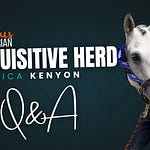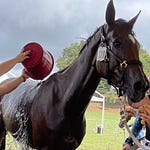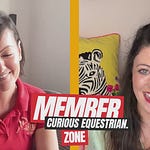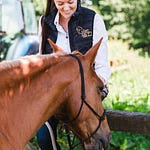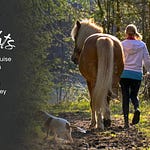Kate Nelligan left the entertainment world to build something rather different: equine-partnered coaching where horses help humans navigate everything from addiction recovery to what she calls the "friendship recession." But this isn't mystical horse whispering. It's a frank look at what happens when someone questions whether we're actually partnering with horses or just using them with better marketing.
Deep Dive
Guest: Kate Nelligan, Equine-Partnered Life Coach
Key Topics:
Escaping the "type A yes girl" trap via Arabian mare intervention
Why some yards ban mares (and whether that says more about us than them)
The friendship recession and how horses accidentally become therapists
What "drop the agenda" actually means when your horse says it
The Big Takeaway
What struck me most wasn't Kate's claims about horses being healers. It was her observation that horses simply operate at a different frequency from stressed humans. They're present-moment creatures dealing with people who live entirely in their heads, catastrophising about futures that may never happen.
The result? Horses become accidental mindfulness teachers. Not through mystical connection, but through basic biology. Their heart coherence, their four-feet-on-ground energy, their prey animal ability to reset after stress responses. These aren't spiritual gifts. They're observable realities that affect the humans around them.
Which raises an uncomfortable question: if horses can regulate our nervous systems just by existing near us, what does that say about how we're living?
Three Things That Stood Out
1. "Drop the agenda" – When your horse calls out your bs
Kate's grey Arabian mare once made it clear she needed to "drop the agenda" during liberty work. Not through telepathic communication, but through the universal horse language of "I'm not playing this game."
This wasn't cosmic wisdom. It was a horse pointing out the difference between genuine collaboration and human-imposed goals dressed up as partnership.
Why this matters: How often do we approach horses with our own needs front and centre, then wonder why they seem reluctant participants? True partnership requires examining whose objectives are actually being met.
2. The friendship recession is real
Kate identifies something many recognise but rarely name: we're experiencing a "friendship recession." People report feeling isolated, struggling to maintain meaningful connections outside family and work.
Horses provide what many humans currently lack – fully present, non-judgemental companionship. They're not scrolling phones, multitasking, or bringing emotional baggage to every interaction.
The uncomfortable bit: If we're turning to horses for basic social connection, what does that say about our human relationships? And is it fair to ask horses to fill gaps in our social lives?
3. "Horses don't ‘should’ themselves" – The productivity culture mirror
Perhaps the most sobering observation: horses don't operate from shame, guilt, or "should" statements. They follow what feels good, rest when tired, and don't apologise for having needs.
Kate's transformation from "type A yes girl" to someone who questions ego goals versus soul goals holds up an uncomfortable mirror. When did we decide that being perpetually busy equals virtue?
The question: If horses can show us a different way of being, why are we so resistant to learning it?
Deep Dive Analysis
The Mare Question: What We Really Fear
Why do people either love or loathe mares? Some yards won't even take them. Kate suggests mares can be "confronting" for people unprepared for complex personalities.
But here's what's curious: we readily accept complexity in geldings and stallions. A difficult gelding is "characterful" or "needs the right rider." A difficult mare is often just... difficult.
This raises questions about what we actually want from our horses. Do we prefer geldings because they're genuinely easier to work with? Or because we've been conditioned to value compliance over character?
Kate's experience suggests something else entirely. Maybe mares self-select their humans. Perhaps the people who thrive with mares are those ready to examine their own assumptions about control and partnership.
Which is uncomfortable if you think about it. What if our horse preferences reveal more about our psychological needs than we'd like to admit?
Stress, Regulation, and What Horses Know That We've Forgotten
Kate's work with addiction recovery revealed something striking. People experiencing withdrawal could regulate their nervous systems within hours around horses.
But here's the bit that should make us squirm: if horses can help humans regulate stress responses so effectively, what are we doing to ourselves daily that requires such intervention?
Kate notes that anxiety is "future-focused" whilst horses live in the present. The implication is uncomfortable. Perhaps our mental health crisis isn't individual pathology but a logical response to living constantly outside the present moment.
Are we medicating symptoms of a lifestyle problem? Could horses be inadvertently showing us how far we've drifted from natural rhythms?
Industry Orthodoxy: When "Partnership" Becomes Marketing
Kate's transition from competitive showing to partnership-based work sidesteps the usual polarisation between "traditional" and "natural" horsemanship. Instead, she asks practical questions: Does this work for both species? Does it create the relationship we actually want?
Her observation that horses often develop nervous breakdowns in competitive contexts isn't anti-competition propaganda. It's pro-choice. Some horses genuinely enjoy their work. Others are performing under duress.
The difference matters. But the industry doesn't always want to acknowledge it.
How much of what we call "training" is actually suppression of natural behaviour? When does legitimate partnership cross into exploitation with better branding? And who benefits when we avoid these conversations?
Questions for Reflection
On partnership: Kate talks about partnering with, not using, her horses. What would actually change in your relationship if you approached every interaction through this lens? More importantly, how would you know if your horse was genuinely choosing to participate?
On the friendship recession: If you're honest, do your horses fill gaps in your social life that humans used to occupy? Is that fair to them? And what does it say about the state of human connection?
On industry assumptions: Kate mentioned yards that refuse mares. What other arbitrary rules in your local horse community might benefit from examination? Which practices continue because "we've always done it this way" rather than because they serve anyone well?
Join the Conversation
What hit home about Kate's corporate-to-horses journey? Have you noticed the friendship recession in your own community? And honestly – do your horses sometimes feel like better company than humans?
Share your thoughts below, especially if you've experienced the shift from goal-driven to relationship-focused approaches.




